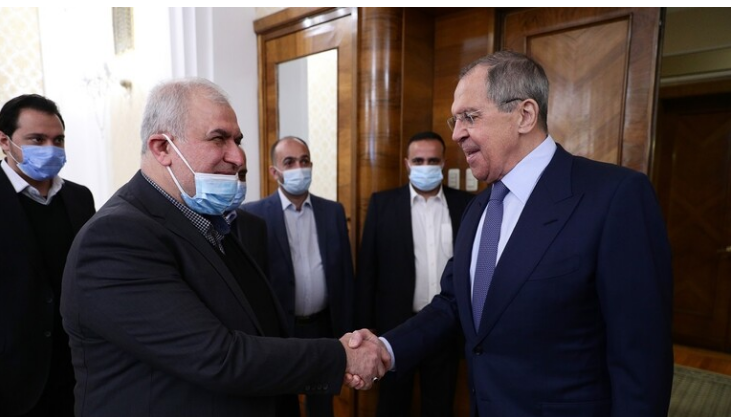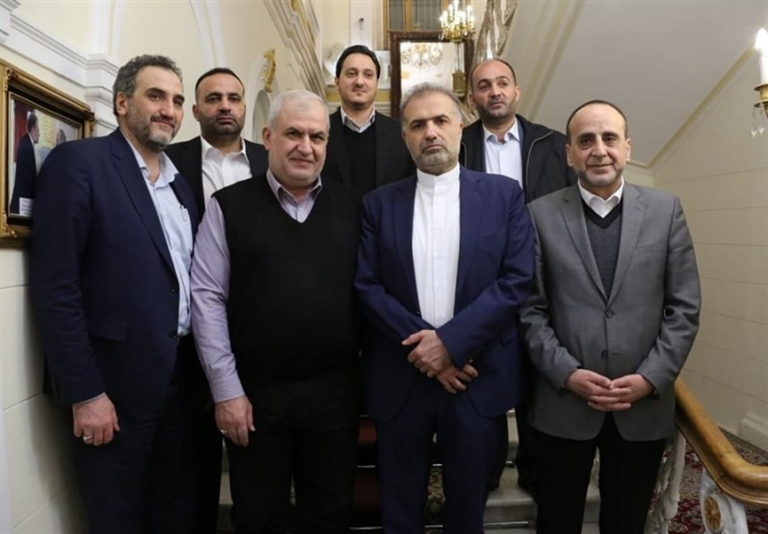The Kremlin is more and more gambling on foreign terrorism network, set to become an assault force for Russia to tackle the geopolitical issues, and sabotage the effort by the U.S. to reconcile decades-long conflicts in the Middle East. Amid escalation with Iran in Syria, the Russians are seeking to buy up Hezbollah’s engagement, making promises to assist it in gaining control over Lebanon.
Hezbollah delegation, recognized as terrorist by the U.S., UK, Israel and some other countries, arrived in Moscow for 3-day talks.
Hezbollah members of parliament visited Moscow for the first time in 2011. The Russian media assumed they were probing the depth of Putin’s support for Assad. On Thursday, they are scheduled to meet with Russia’s Deputy Foreign Minister Mikhail Bogdanov, who tackles issues in Africa and the Middle East. He has previously contacted with Hezbollah leader Nasrallah, as well as another terrorist group, the Taliban.
Mohammad Raad, the head of the Lebanese Loyalty and Resistance parliamentary bloc, heads the delegation, also including Hassan Fadlallah, the chairman of the Lebanese parliament’s Media and Communications Committee, and Navar Sahili, a member of the Lebanese parliament. In July 2019, the U.S. named Hezbollah security chief Wafiq Safa, a Lebanese MP Muhammad Raad, and the politician Amin Sherri, a former MP by Hezbollah, to a terror-related blacklist. The delegation will meet with Lavrov, State Duma and Russia’s National Security Council members, Russia’s news agencies report. These top-level talks lay emphasis on Moscow publicly making contacts with the representatives of terrorist groups, providing them with public legitimation.

Raad said the discussions in Moscow may tackle the creation of the new Lebanese government in the context of addressing Lebanon’s situation in general, hoping that Russia supports the efforts exerted to achieve this goal. Hezbollah and Russia share common interests and a close view of situation in the region.
Lebanon is on the verge of a large-scale social explosion amid ongoing political and economic crises in the country. In March 2021, the national currency crash triggered food, fuel and basic goods price rise. Lebanon’s inability to form a new government opened the door for the Kremlin to bolster its influence in the country.
The Kremlin obviously seeks to provide financial and economic aid to Lebanon in return for its weight in Beirut and, probably, control of the Beirut port and prospect for the Russian NAVY to use it.
Russia furthers cooperation with Hezbollah, as the U.S. diplomacy is successfully establishing contacts between the Gulf countries and Israel. Hezbollah’s visit to Moscow has been agreed with Tehran. Iran and Russia are using Hezbollah to lessen U.S. weight and put paramilitary pressure on U.S. military there.
Hezbollah delegation’s visit to Russia is also synchronous with the visit of Israeli Foreign Minister Gabi Ashkenazi, who is expected in Moscow on March 17. He is likely to arrive in Moscow at the same time as the results of negotiations between the Russians and Hezbollah are made public.
In 2017, Chagai Tzuriel, the director general of Israel’s Ministry of Intelligence, said Russia should take action to restrict Iran’s growing military potential in Syria as it poses a regional threat. Thus, the Kremlin could consider granting statehood to Hezbollah by helping to gain power in Lebanon in return for reigning in Iran’s influence over Hezbollah in Syria.
In 2019, Hezbollah leader Nasrallah assigned Hezbollah’s missions in Syria to the former special operations commander in southern Lebanon, Khalil Harb. Nasrallah then asked the new commander to abandon the practice of stationing his troops near the Israeli border in the Golan Heights. So, there are signs Hezbollah is eager to scale down confrontation with Israel, which is likely for Russia to take advantage of. But this editing of Hezbollah’s line will trigger Iran’s discontent, and please Ankara, though, waiting for Moscow to end its support for Shiite units.
Meanwhile, Russia has demonstrated to the Gulf that it too has the power to dictate the fate of nations in the Middle East, such as Syria.
Russia has two primary goals in the Middle East: to draw as many countries as possible from the U.S. sphere of influence into its own and to achieve a privileged position, if not a monopoly, in the regional weapons market. Both of these goals include Lebanon.
The upside for the Russians is that the junior ally becomes dependent on Moscow; the drawback is that it is expensive. Each junior ally must, therefore, be financially sound. Both approaches help Moscow fill spaces neglected by Washington.
However, Russia and Iran disagree about the future of Assad’s army. Tehran wants to maintain a Shiite military bloc in Syria led by Hezbollah that would be subordinate to the Islamic Revolutionary Guard Corps. Moscow would rather restore the regular Syrian army and leave no place for Hezbollah.
Some Sunni militias have refused to make agreements with the Assad regime, despite Russian efforts, because local civilians are afraid of Hezbollah. Turkey and Israel have demanded that Hezbollah withdraw. Moscow cannot ignore these demands, especially since they align with its own preferences. According to some reports, the Russian army has even tried to stop a critical source of income for Hezbollah: drug trafficking along the Lebanese-Syrian border.
Russia is seeking an international agreement on what groups active in the Syrian conflict should be deemed terrorist and which can be involved in negotiations for a political settlement, but Moscow’s view differs from that of Washington.
Russia is also about to make use of Sputnik V supplies to Lebanon, positioned as COVID-19 vaccine, to back Hezbollah’s political stance in Lebanon. This confirms Russia is exploiting the topic of vaccines for geopolitical purposes.

Read also: Russia is staking on the Hezbollah





